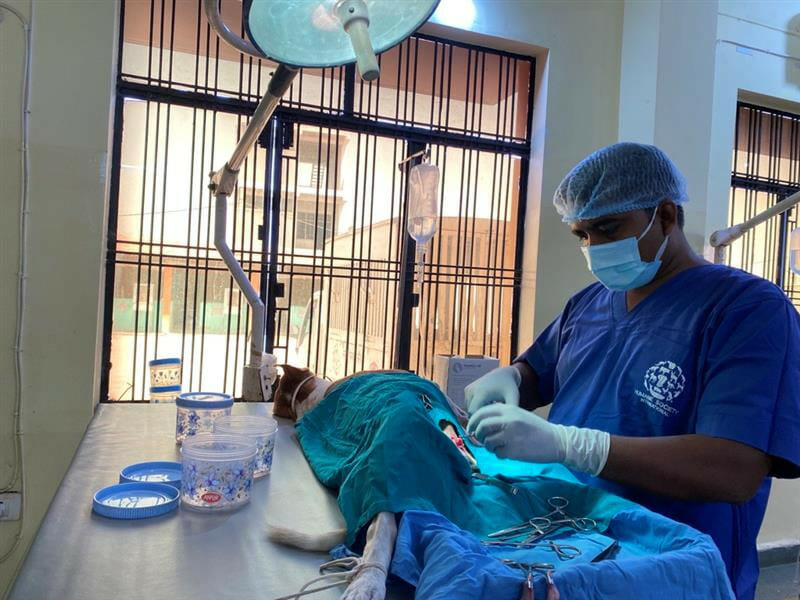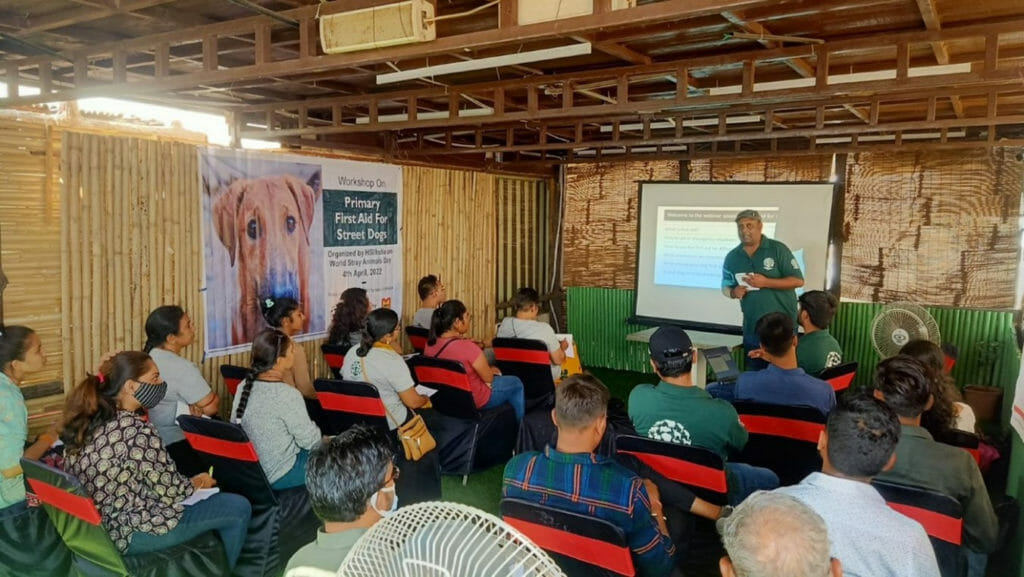The landscape of street dog management programmes in India has changed significantly in the last few decades, as rapid urbanisation and growing interest in animal welfare has brought such programmes to higher prominence. The Animal Birth Control (ABC) Rules, 2001, (amended in 2010) were formulated as a guiding document for all state and city administrations and Animal Welfare organisations, on the dos and don’ts of conducting mass street dog sterilisation and vaccination programmes.
While all street dog sterilisation programmes are implemented in India according to these rules, the actual implementation of these programmes is not without challenge. The rules have been developed by the central government, but the implementation is to be done by States. There is a lack of coordination between the centre and states, with poor or no budget or resource allocation.
There is often a discrepancy between written rules and reality on the ground. For example, every municipality needs to ensure that the infrastructure and vehicles for an animal birth control programme are developed and provided to the implementing agency based on the rules – it is almost never the case. Furthermore, since the appearance of these rules, significant changes in technology, veterinary sciences and social perception of street dogs have reshaped the field of play for ABC programmes.
At the same time, these changes have created a new range of opportunities for the establishment of successful, sustainable and humane canine street dog management programmes. They have also increased the burden on organisations implementing animal birth control and seeking to develop and extend such programmes.
The ABC Rules include pet and street dogs in their ambit and prescribe the establishment of a committee by the municipal corporation, constituted of various stakeholders – government, local animal societies, non-governmental entities and individual experts. The committee has multiple responsibilities, including directly overseeing ABC; developing strategies for public awareness and guidelines for pet owners and breeders; conducting population surveys; monitoring dog bites; and staying abreast of research related to ABC.
Unfortunately, the reality is that most states do not have such active monitoring committees. This kind of committed engagement is necessary if ABC programmes are to have any chance of being implemented successfully.

Lacking the three Ts: Transparency, technicality, and tenacity
In most cities, the urban local body (ULB) serves as the prominent stakeholder in street dog management and is involved in all stages including initiating the tendering process, oversight and implementation, and monitoring progress. For ABC to better serve the goal of animal welfare, changes are required at each of these stages.
Surveys to start with
The city administrations invite interested Animal Welfare Organisations (AWO) into a bidding process. The AWO is selected to implement the project, if they meet the technical and financial criteria decided by administrations. While the tendering for a project (the government process of getting bids for projects) is usually the first step, it would be better if the tender were preceded by a dog population baseline survey.
The success of any dog population management programme depends on a clear pre-knowledge of how many dogs are present in a targeted area. While a dog population survey is mentioned in the rules, it isn’t mandatory. However, without this estimate, there can be no target established, no effective budget and resource planning, and ultimately no real ability to measure impact over time.
The aim of ABC is to achieve at least 80% of sterilisation and vaccination in a given dog population, ideally within a short period of time (i.e. 3-5 years). But in reality, ABC projects across India tend to go on for decades. All too often, this has no real impact on the ground, as dogs are being sterilised at a rate consistently outpaced by the continued population growth of unsterilised dogs.
Not knowing the given dog population in a specific area also means that there is no clear understanding of the type of infrastructure required – the number of kennels needed, required vehicles and response team size, for example. Often the target is decided arbitrarily, based on existing resources and not upon the dog population dynamics. Ineffectual programmes are like running on a treadmill while falling ever further behind.
Improving the tender process
In an ideal scenario, once a dog population survey is completed, a tender is published by the municipal corporation or Nagar Palika. This tender is finalised in two stages, involving a technical and a financial bid. The organisation that passes the technical bid goes into the financial round.
This is where it gets difficult, for the cost of surgery, if done in volume, can be anywhere upwards of Rs 1500 per dog. Most organisations quote low to get the bid, a practice with many implications for the quality of the work. This is often the underlying reason for poor ABC programme outcomes.
For example, if organisation A has been selected, it must now fulfill all the technical requirements – which include verifying that their veterinarians are registered with the Veterinary Council of India or their State Veterinary Council and have performed a certain number of surgeries. They must also demonstrate that they have the necessary equipment, proper vehicles, kennels and food for the dogs.
Monitoring, monitoring…and more monitoring
Once organisations begin an ABC project, there is a monthly monitoring process involving a report. Payments are generally made based on a count of reproductive organs (testicles, ovaries and uterus) removed during surgery, which means that an organisation must store the organs until they are verified by the government veterinarian. Payment is then made per dog.
The loopholes associated with this practice are troubling, with stories about organs being shared between multiple organisations to secure unjustified compensation. It is important that all such organs be safely destroyed immediately after verification has taken place.
Dog welfare is a commonly cited concern in animal birth control programmes, particularly those run by organisations with inadequately trained staff. Horror stories abound involving first-time catchers or handlers dragging dogs by their hind legs into kennels because they’re scared about the possibility of the dogs biting them. Surgeries conducted without proper anaesthesia, pain management, and aseptic technique have compromised animal welfare, leading to situations like dogs waking up during surgery or dying painfully on the table. There is simply no room for substandard practices that lead to animal cruelty and suffering in an ABC programme.
Regular monitoring through dog count surveys can be one of the ways to monitor programmes and their impact. Better monitoring can only help to weed out organisations that do not meet the basic criteria or observe the standards of good animal welfare practice. Moreover, they can help identify areas where an organisation might benefit from advice and capacity-building support. This is an important function of the monitoring committee set up by the local municipality.
Transparency through technology
The internal and external monitoring of a programme is important to ensure good animal welfare and effective working. There are now mobile applications available that can help to document and assess the entire ABC process, producing analytics and data to improve the programme.
At this time, most record keeping around animal birth control is still carried out on paper. This approach has inherent limitations, and that’s why Humane Society International (HSI) has developed a mobile application to gather and track data for spay/neuter, catch-neuter-vaccinate-return (CNVR) of dogs. This app promises to allow for real-time monitoring, tamper-proof data collection concerning capture and release of dogs to their original locations. These results are possible because geo-tagging of photos of the dogs makes it possible to document all details from capture, surgery, care and release of each one.
The humane element
Community trust is vital for the success of animal birth control programmes. In the past, community trust has sometimes been eroded by poor practices and standards in ABC work: dogs dying, dogs being inappropriately released in the wrong communities, and surgical complications compromising their welfare. Community support is particularly necessary to facilitate the capture, transport and return of dogs for surgery. Untrusting residents are reluctant to allow unsterilised dogs to be taken away from their communities as they fear they may never come back, due to carelessness in release and relocation or the possibility of their deaths due to poor surgery.
Read more: Bengaluru’s Canine Squads ensure well-being of street dogs and the local community
It’s critical to recognise the point that dog-related issues cannot be solved via sterilisation alone. ABC programmes need to take deep account of the human-animal bond and the nature of interactions between dogs and people. Attitudes towards dogs can vary dramatically from community to community and in each one, there are people who either care for dogs or those who do not want them around.
Through our work in Vadodara, Lucknow, Dehradun, Nainital, Mussoorie, Hisar, Jamshedpur and many other locations, the element of engaging openly with people has always led to an improvement in a street dog’s life. A good ABC programme should include elements of working with communities.
We have seen communities change from requesting relocation to agreeing to manage feeding and water spots so that the street dogs are cared for, and people aren’t disturbed. People who never wanted a dog sterilised, eventually helped our teams catch hundreds of unsterilised dogs and followed up closely to make sure they were all healthy post-surgery. People who see good ABC work have convinced people about the need for the ABC work in their neighbourhoods.

Communities often say they do not have information on how to deal with the issues around a dog and are looking, most often, for humane solutions. Community engagement is essential and needs to be integrated into the ABC process. Residents in a given community are often the most vigilant about the needs and treatment of their neighbourhood dogs and can be a source of unbiased feedback about the situation on the ground.
Moreover, many people are looking for support, along with information on rabies, avoiding dog bites, dog behaviour, first aid for dogs and available resources to help care better for street dogs. Meeting the demand for such information and services offers ABC programme personnel expanded opportunities to help residents better understand what the programme is doing in their communities.
Read more: Pointers for those who want to help stray dogs and community animals in Chennai
In an effort to mitigate human-dog conflict, most cities have launched a helpline that people can submit a complaint to. The resolution process however varies from city to city and is largely unregulated. Engaging with people and communities, including those who may hate dogs, is the only way forward.
Even for a successful ABC programme, there is always room to grow. Working with communities to organise volunteers to be first responders, facilitate conversations over issues of conflict, identify feeding and water routes that don’t encroach on people’s spaces, and encourage sterilisation and vaccination of dogs can all help build safer communities and sustainable long-term solutions.
There is a specific objective that ABC has, but it has to be seen in the larger context in which it operates and build in elements into the ABC programme, which can help achieve those objectives with compassion, care and respect for all animals and people involved.
Please sterilize female dogs in purba bardhman….female dogs are suffering because of male dogs.and population and nuisance is also increasing.